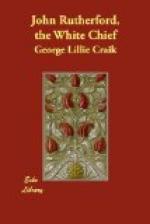“The corpse was first removed to an unoccupied piece of ground in the centre of the village, and there placed with a mat under it, in a sitting position against a post, being covered with another mat up to the chin. The head and face were anointed with shark oil, and a piece of green flax was also tied round the head, in which were stuck several white feathers, the sort of feathers which are here preferred to any other.
“They then constructed, around the corpse, an enclosure of twigs, something like a bird’s cage, for the purpose of keeping the dogs, pigs, and children from it; and these operations being over, muskets continued to be occasionally fired during the remainder of the day to the memory of the old woman. Meanwhile, the chiefs and their families from miles around were making their appearance in our village, bringing with them their slaves loaded with provisions. On the third day after the death, they all, to the number of some hundreds, knelt down around the corpse, and, having thrown off their mats, proceeded to cry and cut themselves, in the same manner as we had seen done on occasions of the different chiefs of the villages through which we passed being welcomed home.
“After some time spent in this ceremony, they all sat down together to a great feast, made of their own provisions, which they had brought with them.
“The next morning, the men alone formed a circle round the dead body, armed with spears, muskets, tomahawks, and merys, and the doctor appeared, walking backwards and forwards in the ring. By this time, my companion and I had learned a good deal of their language; and, as we stood listening to what was said, we heard the doctor relate the particulars of the old woman’s illness and death; after which, the chiefs began to inquire very closely into what she had eaten for the three days before she expired.
“At last, the doctor having retired from the ring, an old chief stepped forward, with three or four white feathers stuck in his hair; and, having walked several times up and down in the ring, addressed the meeting, and said that, in his opinion, the old woman’s death had been occasioned by her having eaten potatoes that had been peeled with a white man’s knife, after it had been used for cutting rushes to repair a house; on which account, he thought that the white man to whom the knife belonged should be killed, which would be a great honour conferred upon the memory of the dead woman.
“To this proposal many of the other chiefs expressed their assent, and it seemed about to be adopted by the court. Meanwhile, my companion stood trembling, and unable to speak from fear. I then went forward myself into the ring, and told them that if the white man had done wrong in lending his knife to the slave, he had done so ignorantly, from not knowing the customs of the country.
“I ventured at the same time to address myself to Aimy, beseeching him to spare my shipmate’s life; but he continued to keep his seat on the ground, mourning for the loss of his mother, without answering me, or seeming to take any notice of what I said; and while I was yet speaking to him, the chief with the white feathers went and struck my comrade on the head with a mery, and killed him. Aimy, however, would not allow him to be eaten, though for what reason I never could learn.




